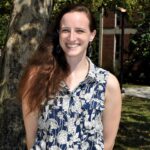2019 Irene E. Harms Graduate Scholarship Award Recipient Announced
The Irene E. Harms Award recognizes the outstanding academic potential of students who strive for academic excellence in one or more of three areas of child psychology: translational science, community-engaged research, and outreach to communities. Translational science includes research that bridges basic science and real-world applications and includes policy research. Child Clinical and Developmental graduate students in the Department of Psychology can apply for the award, which provides $2300 to be used for a variety of research-related activities and costs for translational and/or community-engaged research, and/or for community outreach.
We are pleased to announce the 2019 Irene E. Harms Award recipient: Meghan McDoniel, a Developmental Psychology graduate student.
 Meghan’s primary research interest is in how individual, familial, and contextual characteristics influence the social-emotional development of children during early childhood, and its application to early intervention programs and education policies. Meghan’s mentors are Kristin Buss and Karen Bierman. Meghan received her BA in Psychology from Grinnell College, taught pre-kindergarten through Teach for America, and earned her M.Ed. from the University of Missouri. As a graduate student, she works in several labs and is a fellow in the Training Interdisciplinary Educational Scientists (TIES) fellowship program. In September of 2018, Meghan began as a fellow with the Pennsylvania State Office of Child Development and Early Learning (OCDEL) in Harrisburg, PA. As a fellow, she has learned a great deal about how early childhood policies are created, implemented, and assessed at the state level and the importance for collaborative policymaking. Meghan is grateful for the Irene E. Harms Award as it will allow her to extend her work with OCDEL beyond the end of her fellowship year. This valuable experience during her pre-doctoral years will benefit her training and help move her postdoctoral career in the direction of translating the evidence-base into practice, helping schools and educating policy makers in the area of basic and applied socioemotional development.
Meghan’s primary research interest is in how individual, familial, and contextual characteristics influence the social-emotional development of children during early childhood, and its application to early intervention programs and education policies. Meghan’s mentors are Kristin Buss and Karen Bierman. Meghan received her BA in Psychology from Grinnell College, taught pre-kindergarten through Teach for America, and earned her M.Ed. from the University of Missouri. As a graduate student, she works in several labs and is a fellow in the Training Interdisciplinary Educational Scientists (TIES) fellowship program. In September of 2018, Meghan began as a fellow with the Pennsylvania State Office of Child Development and Early Learning (OCDEL) in Harrisburg, PA. As a fellow, she has learned a great deal about how early childhood policies are created, implemented, and assessed at the state level and the importance for collaborative policymaking. Meghan is grateful for the Irene E. Harms Award as it will allow her to extend her work with OCDEL beyond the end of her fellowship year. This valuable experience during her pre-doctoral years will benefit her training and help move her postdoctoral career in the direction of translating the evidence-base into practice, helping schools and educating policy makers in the area of basic and applied socioemotional development.